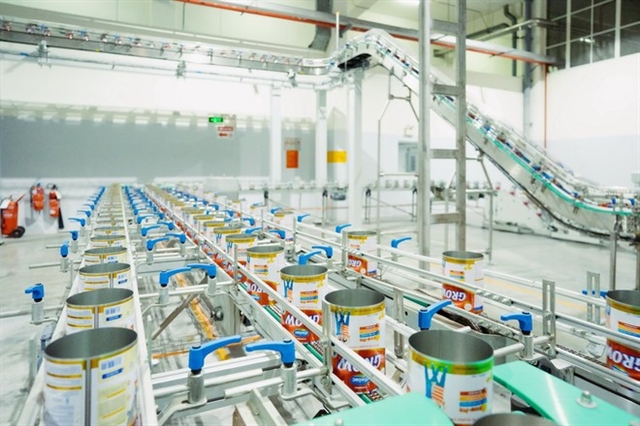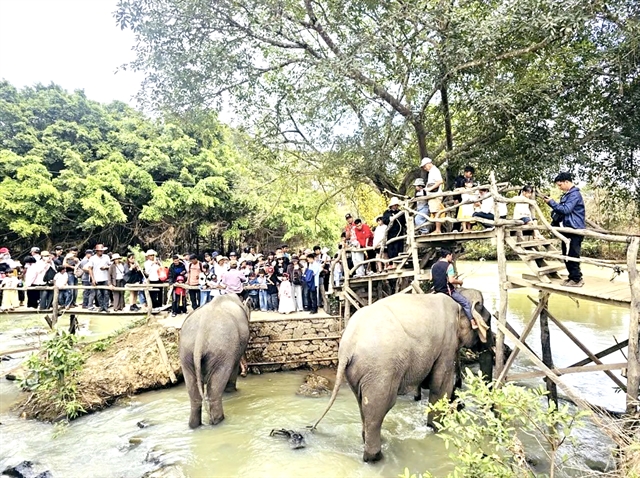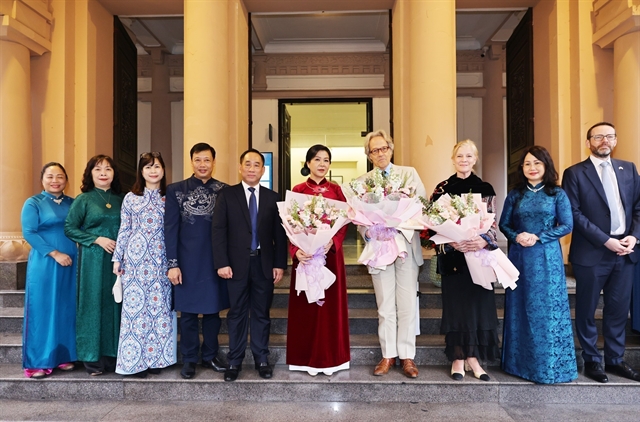 Politics & Law
Politics & Law
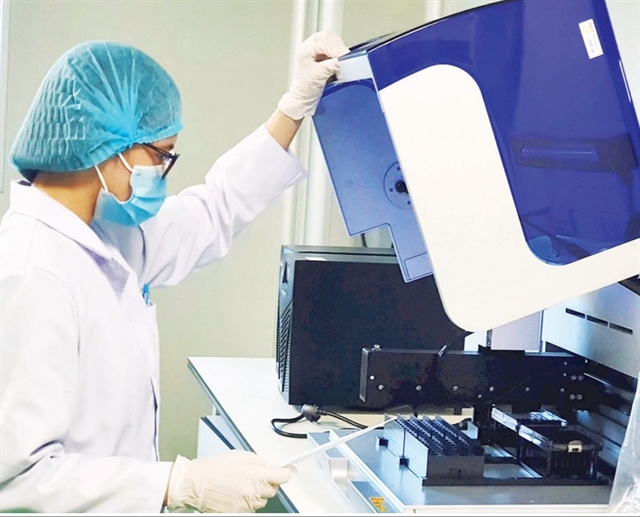
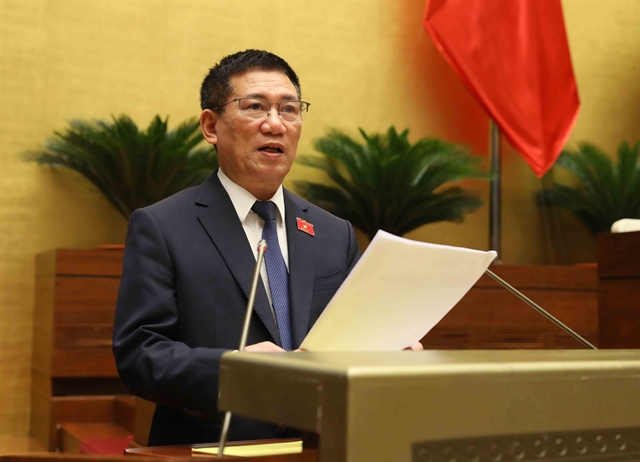
|
| Minister of Finance Hồ Đức Phớc speaks at the session. VNA/VNS Photo |
HÀ NỘI — The National Assembly on Tuesday reviewed Government's Report and the verification report on the implementation of thrift practice and waste prevention in 2022.
Minister of Finance Hồ Đức Phớc highlighted the significant achievements made in 2022, despite numerous domestic and international challenges.
The socio-economic situation has witnessed significant and comprehensive positive changes across various sectors, achieving and surpassing 13 out of 15 key targets, according to the report. Notably, the GDP growth rate exceeded expectations, reaching 8.02 per cent, the highest in the past decade, while inflation remained below four per cent as targetted by the National Assembly.
Regarding the management and utilisation of state budget funds, the Minister of Finance emphasised the successful completion of the set targets for the 2022 State budget expenditure, thanks to proactive administrative measures. Ministries, branches, and localities reported total savings of more than VNĐ53 trillion (US$2.2 billion) in state budget and capital in 2022.
The government also made progress in improving the structure of public debt and government debt, aligning with the five-year public debt repayment and borrowing plan for the 2021-2025 period and the Public Debt Strategy's vision until 2030.
Efforts to renovate the organisation and management system and enhance the quality and performance of public and important non-business units, as outlined in Resolution No. 19-NQ/TW of the Central Committee, remained a priority for the government. Mechanisms and policies on financial autonomy were continuously improved, leading to significant savings through the implementation of lump-sum spending and the allocation of financial autonomy to ministries, branches, and localities. Notable savings were seen in Hà Nội (VNĐ 1.1 trillion) and HCM City (VNĐ1.2 trillion).
In terms of natural resource management, the country successfully converted nearly 20,000 hectares of agricultural land for non-agricultural purposes and took measures to address slow-moving or underutilised investment projects covering an area of over 10,000 hectares. Mineral activity licence dossiers were diligently appraised and settled in compliance with the law, resulting in a revenue of VNĐ 4.1 trillion from mineral exploitation in 2022.
In terms of the tasks and solutions for thrift practice and waste prevention in 2023, the Prime Minister issued Decision No. 1658/QĐ-TTg, outlining eight key tasks and four groups of solutions to be implemented. Ministries, branches, and localities are responsible for formulating plans to achieve savings goals and targets within their respective areas of management. They are also tasked with promoting information dissemination on laws, guidelines, and policies related to thrift practice and waste prevention.
Additionally, there will be increased focus on inspecting and examining the implementation of laws and regulations pertaining to thrift practice, anti-wastefulness, and specialised legislation, particularly in areas such as land management, government investment, budget management for science and technology; compiling and publishing textbooks.
In his verification report, Chairman of the Finance and Budget Committee of the National Assembly Lê Quang Mạnh said the Committee in general agreed with the Government's report and commended the government, ministries, and local branches for their proactive efforts and determination in achieving positive results in thrift practice and anti-waste in 2022.
However, the Government report lacked an assessment, analysis, and clarification of the relationship and impact between the implementation of thrift practice and anti-waste and the promulgation of legal documents, standards, modes, and norms. It also fell short in fully evaluating the existing shortcomings, limitations, causes, and responsibilities associated with thrift practice and waste prevention.
The Government released a report on the implementation status, however it lacked clarity on the results and changes compared to the period before the National Assembly issued the Resolution. Specifically, it did not provide sufficient information on the recovery of allocated land that had not been utilised or had been misused, the improvements in the management, exploitation, and utilisation of renewable resources and renewable energy, and the management, exploitation, and use of digital resources, radio frequency bands, telecommunications number stock, and databases.
The verification report highlighted shortcomings, limitations and waste in the management and utilisation of public investment capital. It revealed that the planning for state budget investment is not aligned with the implementation capacity, leading to inadequate allocation of capital by central and local agencies. The allocation and disbursement of capital for the medium-term public investment plan (2021-2025) had not met the prescribed schedule, and the disbursement rate of public investment capital by some ministries, branches, and localities fell short of the target.
By December 31, 2022, the disbursement of new support policies had reached only VNĐ78 trillion, equivalent to 26 per cent of the total allocated capital.
Notably, the implementation of the three national target programmes had been slow and limited, resulting in reduced efficiency of investment capital and significant negative impacts on the programmes' objectives, leading to waste of state resources. The execution and disbursement of investment capital for crucial national projects had been delayed, adversely affecting the achievement of growth targets, reducing the efficiency of investment capital, and resulting in resource wastage.
The Finance and Budget Committee suggested that the Government and the Prime Minister direct ministries, branches, and localities to promptly review, amend, and supplement regulations pertaining to missing norms, standards, and unit prices that are not practical or suitable. Particular emphasis should be placed on completing accounting standards, statistical methods, and information related to infrastructure assets. The aim was to achieve basic completion of accounting standards and publicise state financial statements by 2025.
The Committee said the Government needed to devise immediate solutions to address the slow allocation, disbursement and utilisation of public investment capital. It was crucial to ensure the quality and progress of important national projects, the three national target programmes and economic recovery and development initiatives in accordance with Resolution No. 43/2022/QH15 of the National Assembly.
Additionally, strong measures should be explored for equitisation, divestment, and restructuring of state-owned enterprises, with a focus on enhancing the efficiency of production and business activities and preserving and developing state capital invested in enterprises. VNS

